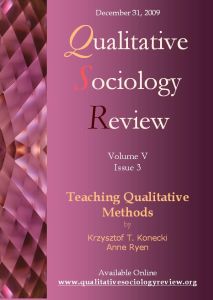Coupling career fairy tale “Fascinating Sociology Class”. How to teach sociology? The sociology of sociology
DOI:
https://doi.org/10.18778/1733-8077.5.3.03Keywords:
Teaching sociology, Context of sociological production, Collaborations in sociology, Sociology of knowledge, Career coupling, Chicago SchoolAbstract
This paper is a simple account of my teaching experience1, the aim of which is to answer the question: “How can we successfully teach interactionism, labeling theory, grounded theory and other sociological bases related to qualitative methods with the active participation of students?”. Through the examples of sociologists working in the Chicago Tradition, French sociologists working with Pierre Bourdieu, and other examples from American sociology, I show that sociological work is group activity. It is argued in this paper, that to make sociological thinking understandable to students teachers may do well to contextualize key theorists in their narrative/biographical context. The students learn, that sociologists are not magicians or genius individuals who produce attractive theories. Rather, they work in collaboration with other humans to generate knowledge. Moreoever, I demonstrate that sociologists’ contributions are often strongly related to and influenced by their broader life context.
Downloads
References
Becker, Howard S. (1963) Outsiders. Studies in the Sociology of Deviance. New York, The Free Press of Glencoe.
Google Scholar
Becker, Howard S. (1986) Writing for Social Scientists. How to start and finish your Thesis, Book, Article. Chicago: University of Chicago Press.
Google Scholar
Becker, Howard S. (1998) Tricks of the Trade: How to Think about Your Research While You're Doing It. Chicago of University Press.
Google Scholar
DOI: https://doi.org/10.7208/chicago/9780226040998.001.0001
Becker, Howard S. and Strauss, Anselm L. (1956) “Careers, Personality, and Adult Socialisation.” American Journal of Sociology vol LXII n°3.
Google Scholar
DOI: https://doi.org/10.1086/222002
Bourdieu, Pierre (2004) - Esquisse pour une auto-analyse, Raisons d’agir, Paris.
Google Scholar
Bourdieu, Pierre and Sayad, Abdelmalek (1964) Le Déracinement. La crise de l'agriculture traditionnelle en Algérie. Paris, Editions de Minuit.
Google Scholar
Bourdieu, Pierre; Darbel,A.; Castel, Robert. and Chamboredon, Jean-Claude (1964) Travail et travailleurs en Algérie. Paris, Editions Mouton.
Google Scholar
Bourdieu, Pierre and Passeron, Jean-Claude (1979) The Inheritors: French Students and Their Relations to Culture. University of Chicago Press.
Google Scholar
Bourdieu, Pierre with Boltanski, Luc and Castel, Robert (1996) Photography: A Middle-Brow Art. Stanford University Press.
Google Scholar
Bourdieu, Pierre with Boltanski, Luc; Castel, Robert and Chamboredon, Jean-Claude (1965) Un Art moyen. Essai sur les usages sociaux de la photographie. Paris, Editions de Minuit.
Google Scholar
Chapoulie, Jean Michel (2001) Tradition de Chicago.Paris, Seuil.
Google Scholar
Deegan, Mary-Jo (1990) Jane Addams and the Men of the Chicago School, 1892-1908. New Brunswick, NJ: Transaction.
Google Scholar
Geertz, Cliford (1973) The Interpretation of Cultures. Basic Books.
Google Scholar
Glaser, Barney and Strauss, Anselm L. (1967) Discovery of Grounded Theory: Strategies for Qualitative Research. Chicago: Aldine.
Google Scholar
DOI: https://doi.org/10.1097/00006199-196807000-00014
Goffmann, Erving (1961) Asylums: Essays on the Social Situation of Mental Patients and Other Inmates. New York, Doubleday.
Google Scholar
Hughes, Everett ( 1994) On Work, Race, and the Sociological Imagination edited and with an Introduction by Lewis A. Coser. The University of Chicago Press, Chicago and London.
Google Scholar
Hughes, Everett; Geer, Blanche and Strauss, Anselm L. (1961) The Boys in White. Student Culture in the Medical School..Chicago, Chicago of University Press.
Google Scholar
Masson, Philippe (2001) “La fabrication des héritiers”. Revue française de Sociologie, (42-3) 2001: 477-507.
Google Scholar
DOI: https://doi.org/10.2307/3323030
Masson, Philippe (2005) “Premières réceptions et diffusion des Héritiers. 1964-1973.” Revue d’Histoire des Sciences Humaines, n°13: 69-98.
Google Scholar
DOI: https://doi.org/10.3917/rhsh.013.0069
Masson, Philippe (2006) “Les effets du développement de la scolarisation dans l’enseignement secondaire dans les années 90”. Les Temps moderns n°637-638-639,: 302-330.
Google Scholar
DOI: https://doi.org/10.3917/ltm.637.0302
Merton, Robert (1968) “The Matthew Effect in Science, Cumulative Advantage and the Symbolism of Intellectual Property”. Science, 159(3810): 56-63.
Google Scholar
DOI: https://doi.org/10.1126/science.159.3810.56
Merton, Robert (1988) “The Matthew Effect in Science, II Cumulative Advantage and the Symbolism of Intellectual Property”. ISIS, 1988, 79 : 606-623.
Google Scholar
DOI: https://doi.org/10.1086/354848
Spradley James P. and Mann Brenda E.(1975) The Cocktail Waitress. Woman's Work in a Man's World. McGraw-Hill, London.
Google Scholar
Thomas, William and Znaniecki, Florian W. (1918-1920) The Polish peasant in Europe and America. Monograph of an immigrant group. Vol. 1,2. Chicago of University Press, 3-5 – Badger, Boston Mass.
Google Scholar
Wagner, Izabela (2006) “Career Coupling: Career Making in the Elite World of Musicians and Scientists.” Qualitative Sociology Review, Vol. II Issue 3. Retrieved September, 2009 http://www.qualitativesociologyreview.org /ENG/archive_eng.php
Google Scholar
Zuckerman, Harriet (1977) Scientific Elite: Nobel Laureates in the United States. New York: Free Press.
Google Scholar
Downloads
Published
How to Cite
Issue
Section
License

This work is licensed under a Creative Commons Attribution-NonCommercial-NoDerivatives 4.0 International License.











